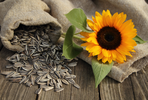
The Sunflower Seed Trap: Why Your Bird’s Favourite Snack Might Be Harming Them
, by Majella Gee, 15 min reading time

, by Majella Gee, 15 min reading time
They crack, they crunch, they keep your bird busy for hours. Sunflower seeds — especially the black oil kind — are often the first thing pet birds pick from their seed bowl, leaving the rest to go stale. And let’s be honest, most owners see this and think, “Well, at least they’re eating something.”
Here’s the uncomfortable truth: that innocent-looking handful of sunflower seeds could slowly be doing more harm than good.

🌻 Why Birds Love Sunflower Seeds
Sunflower seeds are the bird equivalent of fast food — high in fat, tasty, and easy to crack open. The black oil sunflower seeds, in particular, have thinner shells and higher oil content, making them irresistibly rich and energy dense. Perfect for wild birds who burn through calories in the cold, but not ideal for pampered parrots lounging indoors.
Striped sunflower seeds (the ones with the thicker shells) have less oil and more fibre, which makes them a better occasional option. But even then, moderation is key.
⚖️ Black Oil vs Striped Sunflower Seeds
|
Type |
Oil/Fat Content |
Shell Thickness |
Best For |
|
Black Oil |
Very high |
Thin, easy to crack |
Wild birds, winter feeding |
|
Striped (Confection) |
Moderate |
Thicker shell |
Occasional treat for companion birds |
Too much fat from black oil seeds can lead to obesity, liver strain, and poor feather quality, especially in cockatoos, galahs, and other parrots with a slower metabolism.

🪶 The Feather Fallout
You’ve probably seen it — birds that pluck their feathers or have dull, brittle plumage despite “eating well.” In many cases, it’s not a disease; it’s diet imbalance.
Birds addicted to sunflower seeds end up deficient in essential amino acids, vitamins, and minerals found in the other parts of their mix — because they simply don’t eat them. Over time, this can cause:
Cockatoos and galahs are notorious for this. They’re intelligent, stubborn birds who will happily pick through an entire bowl to find the “good stuff,” ignoring everything else.

🛑 The Seed-Only Diet Myth
Many bird owners swear by seed-only diets, arguing their bird “won’t eat anything else.” But that’s not preference — it’s habit. And habits can be changed.
A seed-only diet (especially heavy in black oil sunflower) is like living off hot chips — satisfying in the moment, disastrous long-term. Over time, it can lead to fatty liver disease, one of the most common and preventable health issues in pet parrots.
🥗 Rebalancing the Diet
Here’s what you can do to get your feathered mate back on track:
Patience is key. Birds often need weeks to adjust to a healthier routine. Don’t cave if they sulk or fling their greens across the cage.

🌾 Know Your Source
Where you buy seed matters just as much as what’s in it. Many supermarket seed mixes have been stored too long, sprayed with chemicals, or blended with low-grade filler.
Whenever possible:
Fresh, clean seed is the foundation of a strong immune system and healthy plumage.
🧠 Training Out the Sunflower Habit
Birds are smart — but also stubborn. Breaking their sunflower addiction can feel like arguing with a toddler. A few tips that work:

💚 The Bottom Line
Sunflower seeds aren’t evil — they’re just misused. In moderation, striped seeds can be a great training treat or part of a varied diet. But when black oil sunflower becomes the main event, your bird’s feathers, liver, and lifespan will pay the price.
✨ Majella’s no-fluff verdict:
If your bird’s ignoring half its food and living on sunflower seeds, it’s time for a reset. Nature never designed parrots to live off one snack, and neither should we. Feed variety, question your seed source, and don’t be fooled — that “healthy-looking” black seed mix might be doing more harm than good.
©Majella Gee 2025
#BirdHealth, #AvianCare, #ParrotDiet, #BirdNutrition, #HealthyBirds, #PetBirdTips, #CockatooCare, #GalahLife, #FeatherCare, #PetBirdAwareness, #BirdDiet, #NaturalPetCare, #PetEducation, #ResponsiblePetOwnership, #MajellasPetStore, #BirdLovers, #SunflowerSeeds, #PetParrots, #AvianWellness, #RealTalkForPetOwners